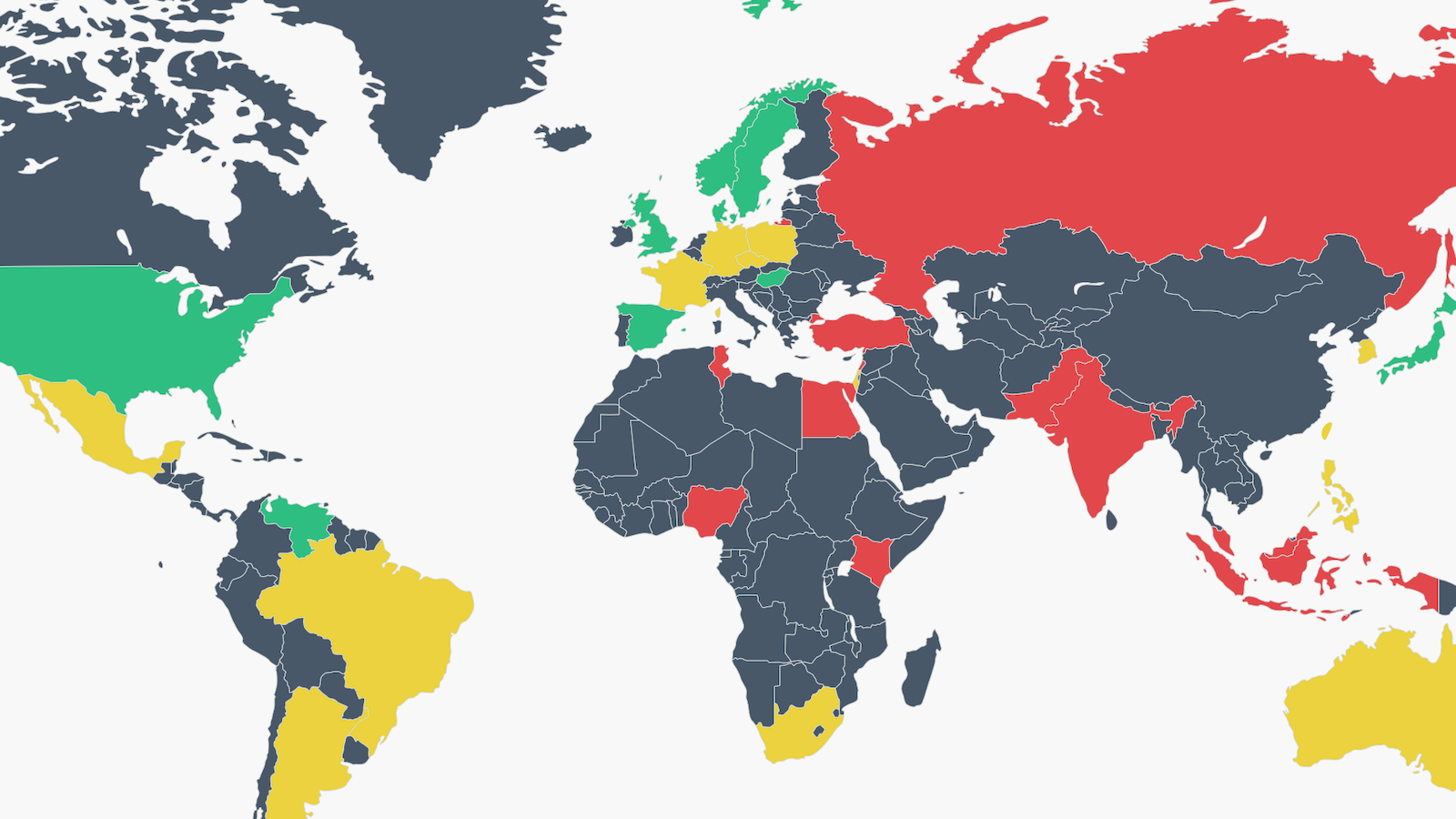Since the end of the Cold War, the US has been trying to create a liberal world order—and it’s been a bipartisan effort, says Stephen Walt, Professor of International Affairs at Harvard University. The problem is that pushing democracy onto other nations is a “delusional” pursuit that destabilizes states in already fractured circumstances. Walt uses the cases of Libya, Yemen and Afghanistan to demonstrate why the US needs an intervention on its constant military interventions. A better approach to US foreign policy? Walt suggests leading by example. The best way to spread democracy abroad might be to have a strong democracy at home. The Charles Koch Foundation aims to further understanding of how US foreign policy affects American people and societal well-being. Through grants, events, and collaborative partnerships, the Foundation is working to stretch the boundaries of foreign policy research and debate by discussing ideas in strategy, trade, and diplomacy that often go unheeded in the US capital. For more information, visit charleskochfoundation.org.
Stephen Walt: Well, the United States really since the end of the Cold War has launched a project to try to spread what you might call a liberal world order in many parts of the world. We started the 1990s thinking that democracy, free markets, and lots of other good things were spreading almost automatically, but the Clinton administration decided to give it a shove with NATO expansion, with a number of other programs designed to spread democracy in various places, and then, of course, the Bush administration took it to the next level with the invasion of Iraq. But this didn’t stop under the Obama administration which, of course, tried to topple Muammar Gaddafi, as well.
So this is a bipartisan product of democratic liberal internationalists and republican neoconservatives, and the basic idea is to try to spread something like the American system in as many places around the world as we could. The problem is: this doesn’t work very well. It failed in Iraq, it’s failing in Afghanistan, it failed in Yemen, it failed in Libya, and it’s not looking particularly good in places like Hungary and Poland, which are starting to show certain illiberal signs. Moreover, the optimism people once had about Russia becoming a member of the democratic family of nations, I think, have been disappointed as well.
Now why has this failed? Well, the first problem, of course, is that spreading democracy into other countries inevitably means regime change. You’ve got to get rid of the existing government and replace it with something new. But of course when you take apart an existing order you can’t be sure what the new order is going to look like, and you’re going to create a lot of angry losers, people who are resentful at their loss of power and status. And in some places like Iraq or Libya they’re able to take up arms to resist this effort.
So simultaneously you create an incentive for resistance, an incentive for insurgency, and by destroying the existing order you also create an open space where terrorists and other extremists can flourish. So a big problem first is: you’re beginning by tearing apart a new order without knowing how to replace it. And that really is the second problem: we don’t know how to create viable democracies in other countries, and especially in countries that have never been democratic before, where there are deep ethnic divisions, where they’re not necessarily very prosperous. And we ought to remind ourselves that it took 200 years or more for democracy to emerge in the West, that was a violent and contentious process. And to believe, as we did in say 2003, that we could invade Iraq and create a shiny new pro-American democracy in five or ten years was positively delusional.
And I think you see this in one final way: when the United States ends up owning one of these countries it has to occupy it, it has to try to keep order, but it doesn’t know enough about the inner workings of that society: which people are reliable? Which people can be trusted to do the kind of social engineering that creating a new nation or creating a new system of government would entail?
So, recently in Afghanistan a local American commander had to apologize for issuing a propaganda leaflet, which included the flag of the Taliban, some Quranic verses, and an image of a dog. Dogs are regarded in parts of the Islamic world as unclean, and to associate that with the Quran, of course, was deeply offensive to many of the Muslims for whom it was intended. Now I mention this only because the United States has been in Afghanistan for 16 years and we still haven’t fully figured out how to operate in that society in order to have reliable positive effects. And the bottom line here is this well-intentioned effort to spread American values, American institutions, into many different corners of the world has been an almost complete failure.
And if the United States wants to promote its values it ought to devote much more effort to creating an exemplary democracy here in the United States so that other countries will look at the United States and say, “I’d like to have something like that,” and then build their version of it. It’s something that we can do leading by example, but not leading with the military edge.
Two more good illustrations of our inability to do nation building in many parts of the world are the failed effort to create a new democracy in Libya. There was an uprising in Libya as a consequence of the Arab Spring and the United States and several of its democratic allies, especially France and Britain, decided to intervene on behalf of the rebel forces. Now this was originally intended, or so we said, as a purely humanitarian act to prevent Muammar Gaddafi, who was at that point still in power, from conducting some kind of mass killing of the rebels. But we quickly expanded beyond that and gave help to the rebels in the form of air power, such that they eventually succeeded.
But of course, once the Gaddafi regime, which was by all accounts a horrific, inefficient despotism, but once it was gone there was no order left, and instead of a stable, effective democracy, what you had instead was the emergence of warlords, factions, militants, and essentially a failed state. It also involved Libya’s very considerable arms arsenal getting spread out and scattered to a variety of other extremist groups in other places, including Syria.
So the bottom line here is: a well-intentioned effort to promote human rights and spread democracy ends up creating a failed state instead. And that is essentially the same story one could tell in a place like Yemen where the United States has repeatedly intervened to try to promote more democratic outcomes, and where we now have another failed state, one where Saudi Arabia has intervened with military force, where there is a cholera epidemic that spreading, vast human suffering, and the country is further away from being an effective democracy today than it was when the United States first started meddling. Again, this just teaches us the lesson that the United States has enough trouble making democracy work here in the United States itself, trying to create it in other places that have never been democratic—and especially trying to do that with military force—simply doesn’t work.
I think there are a set of humanitarian circumstances where the United States should think about intervening. And primarily when we think there is going to be a large-scale mass killing in the order of tens of thousands or hundreds of thousands of people. And in those circumstances we may or may not intervene, depending on, first of all, whether or not we have strategic interest that reinforce the imperative to do more, but also whether or not we are confident that intervention is actually going to make things better as opposed to making things worse.
Now an obvious case of this is Syria. There’s been a horrific civil war going on in Syria now for more than five years, upwards of a half a million people have died and many Americans have wanted the United States to get more actively involved in arming one side or the other or perhaps trying to impose some kind of no-fly zone. The difficulty is: it is hard to be confident that any of those measures are actually going to make the situation better. Why? Because there are really no “good guys” in this particular fight, and to the extent that there are some moderate forces within the Syrian Civil War they are among the weakest and the least likely to succeed.
So if the United States were to intervene, it is as likely to bring some kind of violent extremist, some kind of al-Qaeda offshoot organization like ISIS to power as it is to bring a bunch of nice, peace-loving, pro-American, liberal democrats.
So it would be nice to say remove the Assad regime, put him on trial for war crimes, but what we may be leaving behind would be something considerably worse. So even in the case of a clear humanitarian incentive, and those circumstances will arise from time to time, I think we want to be careful and only intervene when we know we can make it better and when we also see a way to get out so that we don’t end up having to be there for decades.





